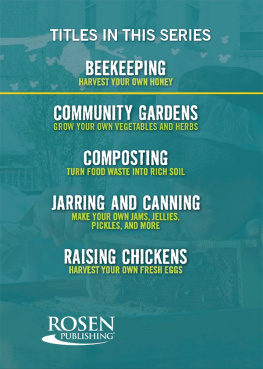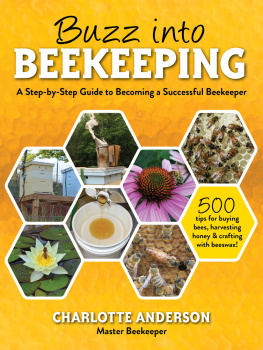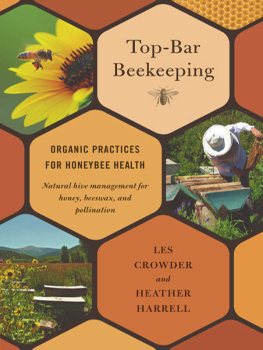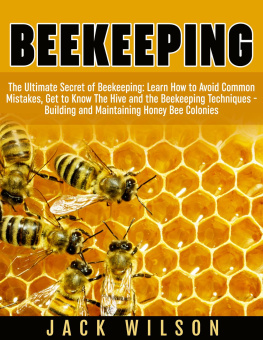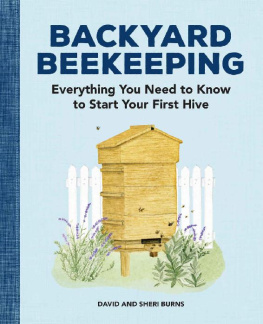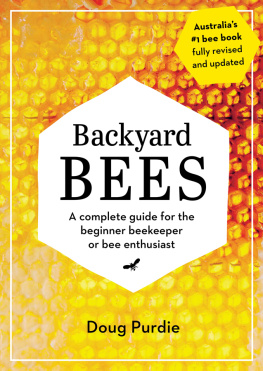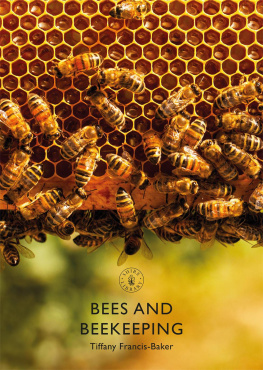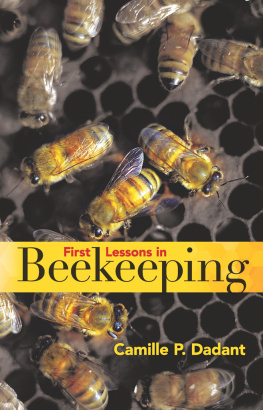
Published in 2014 by The Rosen Publishing Group, Inc.
29 East 21st Street, New York, NY 10010
Copyright 2014 by The Rosen Publishing Group, Inc.
First Edition
All rights reserved. No part of this book may be reproduced in any form without permission in writing from the publisher, except by a reviewer.
Library of Congress Cataloging-in-Publication Data
Hanson-Harding, Alexandra.
Beekeeping: harvest your own honey/Alexandra Hanson-Harding.
p. cm.(Urban gardening and farming for teens)
ISBN 978-1-4777-1778-3 ((library binding))
1. Bee culture. I. Title. II. Series: Urban gardening and farming for teens.
SF523.H244 2014
638.1dc23
2013017443
Manufactured in the United States of America
CPSIA Compliance Information: Batch #W14YA: For further information, contact Rosen Publishing, New York, New York, at 1-800-237-9932.
Contents

H enry Miller is only a teenager. But the Deming, Washington, boy owns his own business, Henrys Humdingers. The company sells a line of special honey called Stingers. The raw, spicy honey comes in such flavors as Naughty Nana, Grumpy Grandpa, and Phoebes Fireball. It is used for making barbecue sauces and generally spicing things up! His honeys are available in more than thirty states and on the Internet.
How did he start? At eleven, Henry met a beekeeper who inspired him to start his own hives. He lives in a rural area, so he had room for hives, and he has a helpful family. He donates part of his sales to the Foundation for the Preservation of Honey Bees. He told Grow Northwest magazine, There are so many mysteries about bees.
Like Henry, people have long been drawn to the mystery of the honeybee, or Apis mellifera. Honeybees, their sweet syrup, and their complex hives have long been a source of fascination. They played a role in the religious myths of many ancient cultures. They have often been used as a symbol for the ultimate cooperative society.
Honeybees are native to Africa, the Middle East, and Europe. Eight-thousand-year-old cave paintings of honey hunters have been discovered in Valencia, Spain. Ancient Egyptians kept honeybees. Greek and Roman writers such as Herodotus and Pliny observed them carefully (although they did get a few facts, such as assuming that the workers were male, and not female, wrong). Since that time, writers have been writing poetically about the details of bee life.
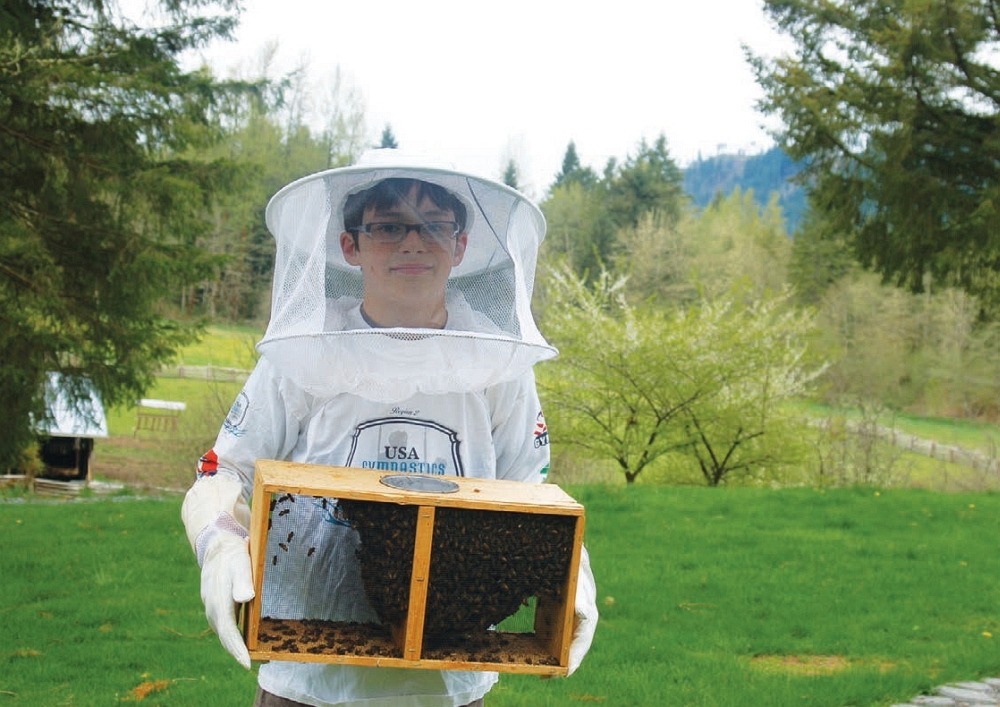
Young beekeeper and entrepreneur Henry Miller shows off some of his bees while dressed in a beekeeping outfit.
In the 1600s, Europeans brought honeybees to North America, where they made themselves right at home. Approximately four thousand bee species are native to North America, but honeybees proved so flexible and their honey such a treasure that their value quickly became clear.
According to the National Honey Board, one-third of the total human diet is derived from insect-pollinated plants. The U.S. Department of Agriculture (USDA) estimates that honeybees alone are responsible for 80 percent of insect crop pollination. According to the Foundation for the Preservation of Honey Bees, Honeybees are premier pollinators because they are available throughout the growing season, they pollinate a wide range of crops, and they can be concentrated whenever and wherever they are needed.
Unfortunately, the honeybee population has been shrinking in recent years. Luckily, people like Henry Miller are coming to their aid. Many are setting up their own apiaries (bee homes) in backyard gardens, on city rooftops, and even in schools. The elegant Waldorf-Astoria Hotel in New York City has six hives on its roof.
Others are writing letters, planting bee-friendly gardens, and spreading the word about the importance of bees. Helping bees is a great way to connect to the environment as a family, school, or group project. By learning more about honeybees, people reap the sweet reward of discovering a fascinating world that we rely on every time we eat a tasty handful of almonds, bite into a juicy apple, or spread golden honey on toast. As bee scientist Karl von Frisch wrote in his book Bees: Their Vision, Chemical Senses, and Language, The bees life is like a magic well: the more you draw from it, the more it fills with water.
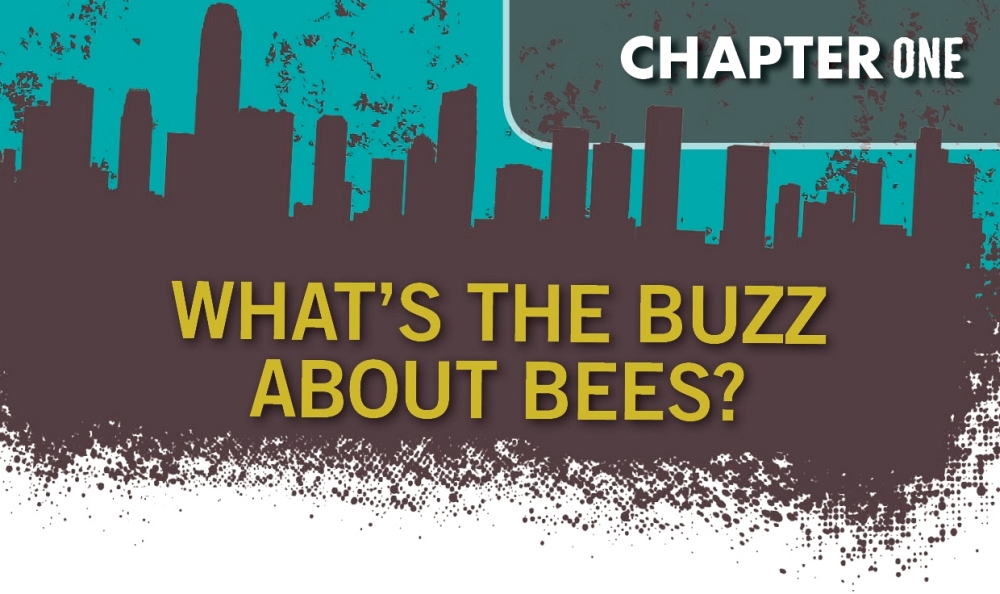
H oneybees make honey, of course. But they are even more valuable for their ability to pollinate crops. What is pollination? Many plant foods we eat, including seeds, nuts, berries, and fruits, are created from a union of male and female germ cells. But plants are stuck in the ground. So how do these germ cells unite? one answer is pollen, a powder containing male germ cells that comes from the male part of the flower, called the stamen. When pollen lands on a pistil (a female part), it fertilizes it. That allows new plants to grow.
The honeybee brings pollen from male to female plant parts when it flies from one flower to the next in the process of gathering nectar, a sweet liquid the flowers make to tempt these little helpers. The pollen sticks to the hairy bodies of the bees and then rubs off on other flowers. Honeybees pollinate more than ninety crops in the United States alone, according to the Associated Press.
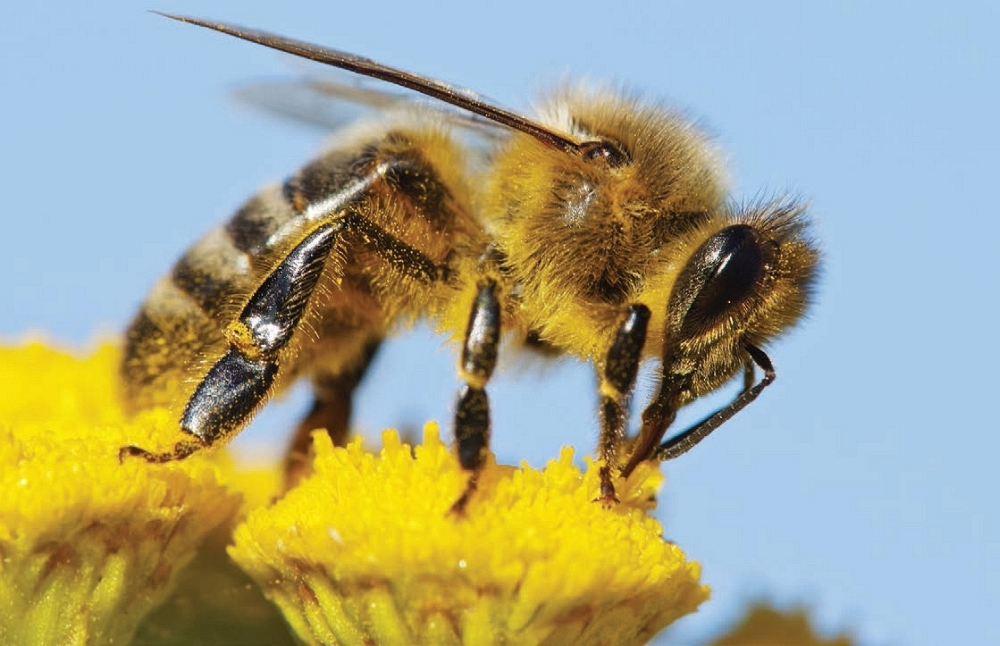
A worker bee gathers sweet nectar and dusty pollen from a yellow flower. As the bee moves to other flowers, it will pollinate them so that they can create new plants.
BEES ARE VALUABLE
According to science news Web site Phys.org, German researchers measured the value of sixty different crops that require pollination. They learned that the value of pollination rose from about $200 billion in 1993 to $350 billion in 2009. They found that the production costs of plants that need pollinationincluding coffee and cocoahave gone up much faster than those that dont, such as rice or grains. Why? The researchers believe that when too much habitat is taken away from insects and too much insecticide is sprayed on fields, honeybees disappear. Then it costs extra money to hire bees to do the pollinating. This [study] could encourage incentives for the protection of insects and their pollination services, said Sven Lautenbach, one of the researchers.
BEES ON THE ROAD
Many large farms in heavily agricultural locations rely on professional beekeepers, who bring their bees in on trucks. The bees spend a few weeks in an area and pollinate the plants. Then the trucks roll on to other locations.
One crop that needs bees is California almonds. About 80 percent of the worlds almonds are grown in central California. The crop is worth about $3 billion a year, according to the National Agricultural Statistics Service (NASS). Every spring, more than 2.6 million colonies of honeybees are needed to pollinate the almonds, according to the Department of Entomology and Nematology at the University of California, Davis. Most of these bees are brought to California each spring on trucks from as far away as Florida.
Some environmentalists are not big fans of the practice.
Next page
